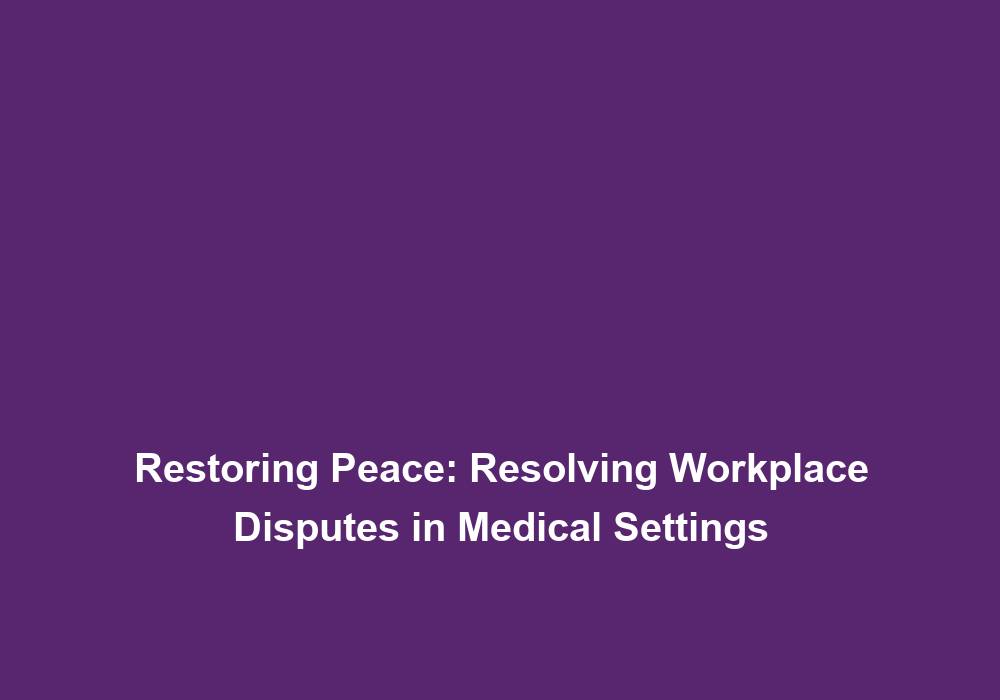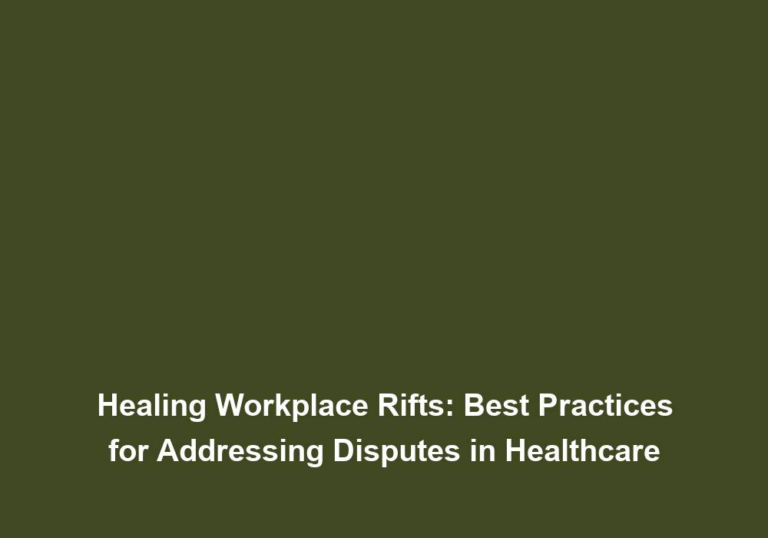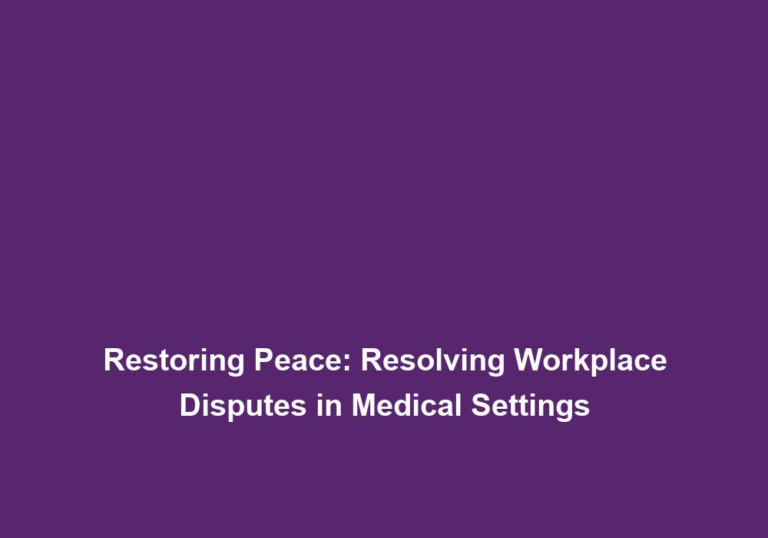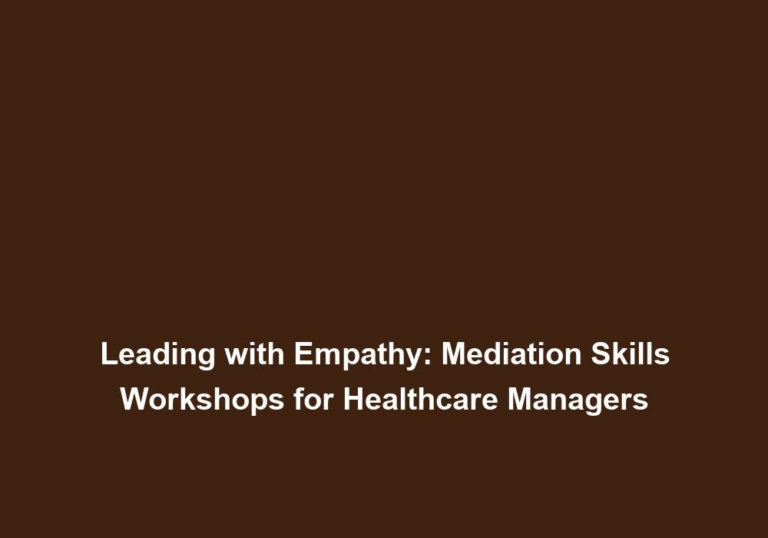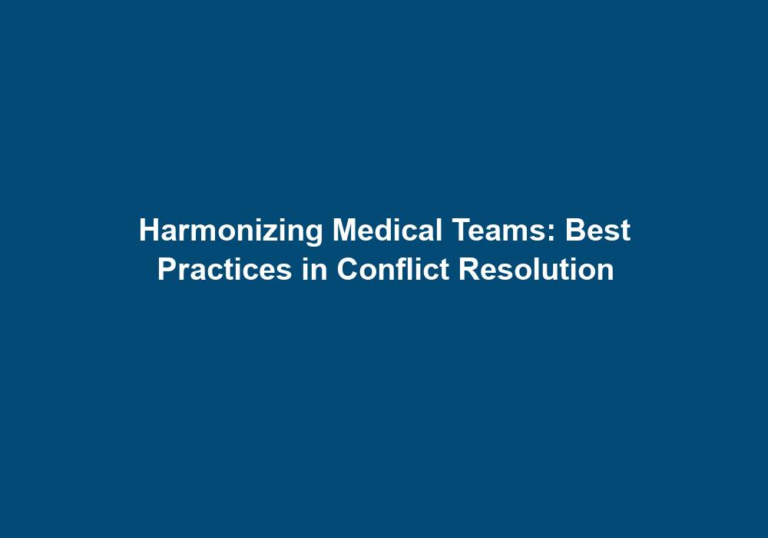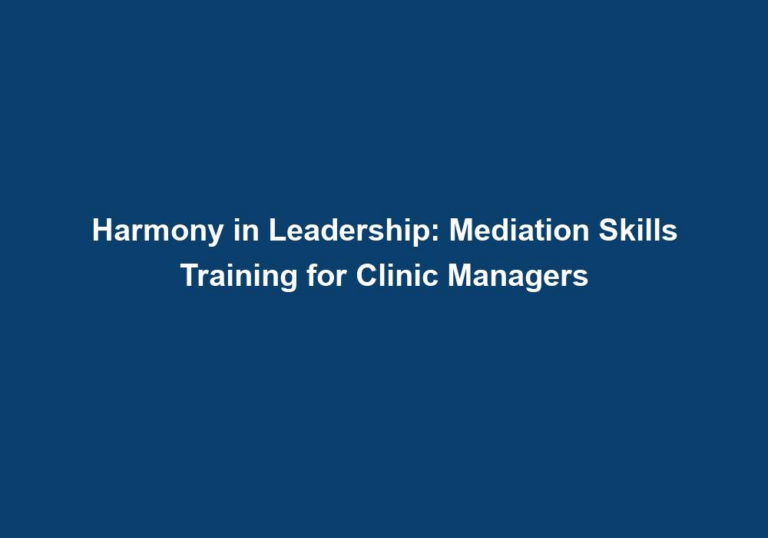Tackling Tensions: Strategies for Addressing Workplace Disputes in Healthcare
Workplace disputes can arise in any industry, but they can have unique implications within the healthcare sector. The high-stress nature of healthcare work, combined with long hours and intense emotions, can sometimes lead to conflicts among employees. It is essential for healthcare organizations to have effective strategies in place to address and resolve these tensions promptly and efficiently. In this article, we will explore some valuable strategies for dealing with workplace disputes in the healthcare industry.
Understanding the Causes of Workplace Disputes
Before diving into strategies for resolving workplace disputes, it is crucial to understand their underlying causes. Healthcare professionals often work under immense pressure, dealing with life-and-death situations, demanding patients, and tight schedules. These stressors can contribute to conflicts among colleagues. Additionally, workplace disputes can arise from:
-
Communication breakdown: Miscommunication or lack of communication can result in misunderstandings and conflicts. For example, when important information is not effectively communicated to all team members, it can lead to errors, frustration, and disputes. Clear and open communication channels should be established to ensure that information is shared accurately and promptly among healthcare professionals.
-
Power imbalances: Hierarchies and power differentials in healthcare organizations can lead to tensions between different levels of staff. For instance, if decision-making power is concentrated at the top, it may lead to feelings of disempowerment and resentment among lower-level employees. To address this, organizations should promote a culture of shared decision-making and collaboration, where everyone’s input is valued and respected.
-
Personality clashes: Healthcare professionals come from diverse backgrounds with different personalities, which can sometimes lead to clashes. These clashes can occur when individuals have contrasting work styles, communication preferences, or approaches to problem-solving. To mitigate the impact of personality clashes, team-building exercises that focus on understanding and appreciating each other’s differences can be implemented. Additionally, fostering a culture of respect and empathy can help individuals navigate conflicts that may arise due to personality differences.
-
Workload concerns: An unequal distribution of work or excessive workload can create friction among team members. For instance, if some employees consistently shoulder a heavier workload while others have lighter responsibilities, it can lead to feelings of inequity and resentment. To address this, organizations should ensure that workloads are distributed fairly and transparently, taking into consideration individual strengths and limitations. Regular check-ins and open communication about workload can help identify and address any disparities.
-
Ethical dilemmas: Healthcare professionals may face ethical dilemmas, which can lead to disagreements on the appropriate course of action. For example, when there is a difference of opinion regarding a patient’s treatment plan or end-of-life decisions, it can create tension among healthcare professionals involved in the care. To navigate ethical dilemmas, organizations should provide opportunities for open dialogue and ethical decision-making training. Establishing clear ethical guidelines and protocols can also help healthcare professionals navigate these complex situations.
Strategies for Addressing Workplace Disputes
Once the causes of workplace disputes are understood, organizations can implement the following strategies to effectively address and resolve conflicts in the healthcare workplace:
1. Promoting Open Communication
Encouraging open and honest communication is crucial in preventing and resolving workplace disputes. Healthcare organizations should foster an environment where employees feel comfortable speaking up and discussing their concerns. This can be achieved through:
- Regular team meetings: Regular team meetings provide an opportunity for open dialogue and collaboration. These meetings can serve as a platform for employees to express their concerns, share ideas, and address conflicts in a constructive manner.
- Active listening: Managers and supervisors must actively listen to their employees’ concerns and address them empathetically. This involves giving employees their full attention, acknowledging their perspectives, and responding in a respectful and supportive manner.
- Feedback mechanisms: Establish feedback mechanisms, such as suggestion boxes or anonymous surveys, to allow employees to express their concerns confidentially. This can help identify areas of improvement and address potential conflicts before they escalate.
2. Implementing Conflict Resolution Training
Providing conflict resolution training to healthcare staff can equip them with the necessary skills to handle workplace disputes effectively. This training can include:
- Effective communication techniques: Training employees in active listening, assertive communication, and conflict de-escalation can significantly reduce the intensity of disputes. By enhancing their communication skills, healthcare professionals can express their concerns more effectively, understand different perspectives, and find common ground for resolving conflicts.
- Negotiation and mediation skills: Equipping employees with negotiation and mediation skills can enable them to find mutually agreeable solutions to conflicts. By facilitating constructive discussions and helping parties explore options for resolution, healthcare professionals can work towards resolving disputes in a fair and collaborative manner.
- Emotional intelligence development: Enhancing emotional intelligence can help healthcare professionals better understand and manage their own emotions and those of their colleagues. This can contribute to improved empathy, conflict management, and the ability to find win-win solutions. Training programs can focus on self-awareness, emotional regulation, and empathy-building exercises.
3. Establishing Clear Policies and Procedures
Having clear policies and procedures in place is crucial for addressing workplace disputes. These policies should outline the steps to be taken when conflicts arise and provide guidelines for resolving them. Key elements to consider include:
- Conflict reporting mechanism: Establish a clear process for employees to report workplace disputes, ensuring confidentiality and protection against retaliation. This can include designated individuals or departments responsible for receiving and addressing conflict reports, as well as mechanisms for anonymous reporting.
- Investigation protocol: Clearly define how workplace disputes will be investigated, by whom, and within what timeframe. This can help ensure a fair and impartial investigation process, where all parties involved are given an opportunity to present their perspectives and evidence.
- Conflict resolution procedures: Outline the steps involved in resolving conflicts, including mediation, intervention by supervisors, or involvement of a neutral third party if necessary. These procedures should emphasize the importance of respectful dialogue, confidentiality, and the pursuit of mutually beneficial outcomes.
4. Encouraging Collaboration and Team Building Activities
Promoting collaboration and team building activities can help prevent workplace disputes and foster a positive work environment. Some effective strategies include:
- Team-building exercises: Organize activities that encourage teamwork, trust-building, and mutual understanding. These exercises can include problem-solving challenges, group projects, or team outings. By fostering positive relationships and a sense of camaraderie, healthcare professionals can better navigate conflicts when they arise.
- Conflict resolution simulations: Conducting simulations or role-playing exercises can help employees practice resolving disputes in a safe and controlled environment. This can enhance their conflict resolution skills, build confidence, and provide an opportunity to test different strategies for resolving conflicts effectively.
- Cross-functional collaborations: Encourage collaboration between different departments and healthcare professionals to foster a sense of unity and shared goals. By working together on interdisciplinary projects or committees, healthcare professionals can develop a deeper understanding of each other’s roles and perspectives, reducing the likelihood of conflicts arising from misunderstandings or lack of awareness.
5. Providing Emotional Support and Wellness Programs
Working in healthcare can be emotionally challenging, and employees need support to cope with the stress. Implementing wellness programs can significantly contribute to dispute prevention and resolution. Consider:
- Counseling services: Make counseling services easily accessible to employees, providing a safe space to discuss their concerns and emotions. Qualified counselors or therapists can help healthcare professionals navigate the emotional impact of their work, cope with burnout, and develop healthy coping mechanisms.
- Stress management programs: Offer stress management techniques, such as mindfulness exercises, yoga classes, or employee assistance programs. These programs can provide healthcare professionals with practical tools to manage stress, improve resilience, and enhance overall well-being.
- Peer support networks: Establish peer support networks where employees can connect with colleagues facing similar challenges, providing a platform for sharing experiences and coping strategies. Peer support can create a sense of belonging, reduce feelings of isolation, and provide emotional validation.
Conclusion
Addressing workplace disputes is essential for maintaining a healthy, productive work environment in the healthcare industry. By understanding the causes of conflicts and implementing effective strategies, healthcare organizations can prevent disputes from escalating and create a more harmonious workplace. Encouraging open communication, providing conflict resolution training, establishing clear policies, promoting collaboration, and offering emotional support are all key components of successfully tackling tensions in the healthcare workplace. By prioritizing the well-being of their employees, healthcare organizations can foster a positive and supportive work environment that benefits both staff and patients alike.

